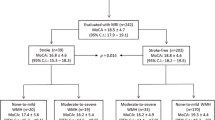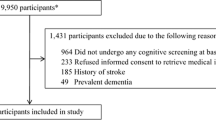Abstract
Few studies exist on subjective cognitive failures after a stroke in young adults (≤50 years) and their relation to objective cognitive performance is unknown. Therefore, we investigated the prevalence of subjective cognitive failures in patients with a stroke in young adulthood and their relation with objective cognitive impairment. This study is part of the “Follow-Up of Transient ischemic attack and stroke patients and Unelucidated Risk factor Evaluation”-study (FUTURE study), including patients, aged 18–50 years, admitted to our hospital between 1980 and 2010 with a first-ever TIA or ischemic stroke. The prevalence of subjective cognitive failures in patients was determined and compared with 146 age- and sex-matched stroke-free controls. The relation of subjective failures with objective cognitive performance was investigated with linear and logistic regression analysis. 160 patients with a TIA and 277 with an ischemic stroke were included. After a mean follow-up of 10.1 (SD 8.3) years, the prevalence of subjective memory failures was 86.4 % and that of subjective executive failures was 67.4 % in patients, versus 69.7 % (p = 0.008) and 41.4 % (p = 0.002) in controls. A weak association between subjective memory failures and objective immediate (beta −0.12, p = 0.011) and delayed memory performance (beta −0.13, p = 0.010) was observed in patients. Subjective cognitive failures are prevalent after stroke in young adults, but not strongly related to objective cognitive impairment. Therefore, extensive neuropsychological assessment is essential for determination of objective cognitive impairment. However, it is important that subjective cognitive failures are recognized as they may indicate underlying psychosocial problems.



Similar content being viewed by others
References
Visser-Keizer AC, Meyboom-de Jong B, Deelman BG, Berg IJ, Gerritsen MJ (2002) Subjective changes in emotion, cognition and behaviour after stroke: factors affecting the perception of patients and partners. J Clin Exp Neuropsychol 24:1032–1045
Duits A, Munnecom T, van Heugten C, van Oostenbrugge RJ (2008) Cognitive complaints in the early phase after stroke are not indicative of cognitive impairment. J Neurol Neurosurg Psychiatry 79:143–146
Lamb F, Anderson J, Saling M, Dewey H (2013) Predictors of subjective cognitive complaint in postacute older adult stroke patients. Arch Phys Med Rehabil 94:1747–1752
Mitchell AJ (2008) The clinical significance of subjective memory complaints in the diagnosis of mild cognitive impairment and dementia: a meta-analysis. Int J Geriatr Psychiatry 23:1191–1202
Juncos-Rabadan O, Pereiro AX, Facal D, Rodriguez N, Lojo C, Caamano JA et al (2012) Prevalence and correlates of cognitive impairment in adults with subjective memory complaints in primary care centres. Dement Geriatr Cogn Disord 33:226–232
Roding J, Glader EL, Malm J, Eriksson M, Lindstrom B (2009) Perceived impaired physical and cognitive functions after stroke in men and women between 18 and 55 years of age—a national survey. Disabil Rehabil 31:1092–1099
Hochstenbach J, Prigatano G, Mulder T (2005) Patients’ and relatives’ reports of disturbances 9 months after stroke: subjective changes in physical functioning, cognition, emotion, and behavior. Arch Phys Med Rehabil 86:1587–1593
Luijendijk HJ, Stricker BH, Wieberdink RG, Koudstaal PJ, Hofman A, Breteler MM et al (2011) Transient ischemic attack and incident depression. Stroke 42:1857–1861
Rutten-Jacobs LC, Maaijwee NA, Arntz RM, Van Alebeek ME, Schaapsmeerders P, Schoonderwaldt HC et al (2011) Risk factors and prognosis of young stroke. The FUTURE study: a prospective cohort study. Study rationale and protocol. BMC Neurol 11:109–116
Rutten-Jacobs LC, Arntz RM, Maaijwee NA, Schoonderwaldt HC, Dorresteijn LD, van Dijk EJ et al (2013) Long-term mortality after stroke among adults aged 18 to 50 years. JAMA 309:1136–1144
Arntz R, Rutten-Jacobs L, Maaijwee N, Schoonderwaldt H, Dorresteijn L, van Dijk E et al (2013) Post-stroke epilepsy in young adults: a long-term follow-up study. PLoS One 8:e55498
Rutten-Jacobs LC, Maaijwee NA, Arntz RM, Schoonderwaldt HC, Dorresteijn LD, van der Vlugt MJ et al (2013) Long-term risk of recurrent vascular events after young stroke: the FUTURE study. Ann Neurol 74:592–601
Arntz RM, Maaijwee NA, Rutten-Jacobs LC, Schoonderwaldt HC, Dorresteijn LD, van Dijk EJ et al (2013) Epilepsy after TIA or stroke in young patients impairs long-term functional outcome: the FUTURE Study. Neurology 81:1907–1913
Brott T, Adams HP Jr, Olinger CP, Marler JR, Barsan WG, Biller J et al (1989) Measurements of acute cerebral infarction: a clinical examination scale. Stroke 20:864–870
Williams LS, Yilmaz EY, Lopez-Yunez AM (2000) Retrospective assessment of initial stroke severity with the NIH Stroke Scale. Stroke 31:858–862
Kasner SE, Chalela JA, Luciano JM, Cucchiara BL, Raps EC, McGarvey ML et al (1999) Reliability and validity of estimating the NIH stroke scale score from medical records. Stroke 30:1534–1537
Schaapsmeerders P, Maaijwee NA, van Dijk EJ, Rutten-Jacobs LC, Arntz RM, Schoonderwaldt HC et al (2013) Long-term cognitive impairment after first-ever ischemic stroke in young adults. Stroke 44:1621–1628
Broadbent DE, Cooper PF, FitzGerald P, Parkes KR (1982) The Cognitive Failures Questionnaire (CFQ) and its correlates. Br J Clin Psychol 21(Pt 1):1–16
de Groot JC, de Leeuw FE, Oudkerk M, Hofman A, Jolles J, Breteler MM (2001) Cerebral white matter lesions and subjective cognitive dysfunction: the Rotterdam Scan Study. Neurology 56:1539–1545
van Norden AG, Fick WF, de Laat KF, van Uden IW, van Oudheusden LJ, Tendolkar I et al (2008) Subjective cognitive failures and hippocampal volume in elderly with white matter lesions. Neurology 71:1152–1159
Verhage F (1964) Intelligentie en leeftijd: onderzoek bij Nederlanders van twaalf tot zevenenzeventig jaar [Intelligence and age: Study with Dutch people from age 12 to 77]. van Gorcum, Assen
Snaith RP (2003) The Hospital Anxiety and Depression Scale. Health Qual Life Outcomes 1:29–32
Vercoulen JH, Swanink CM, Fennis JF, Galama JM, van der Meer JW, Bleijenberg G (1994) Dimensional assessment of chronic fatigue syndrome. J Psychosom Res 38:383–392
Prins JB, Elving LD, Koning H, Bleijenberg G, van der Meer JW (2003) Diagnosing chronic fatigue syndrome: comparison of a protocol and computerised questionnaires. Neth J Med 61:120–126
Rolfs A, Fazekas F, Grittner U, Dichgans M, Martus P, Holzhausen M et al (2013) Acute cerebrovascular disease in the young: the Stroke in Young Fabry Patients study. Stroke 44:340–349
Putaala J, Metso AJ, Metso TM, Konkola N, Kraemer Y, Haapaniemi E et al (2009) Analysis of 1008 consecutive patients aged 15 to 49 with first-ever ischemic stroke: the Helsinki young stroke registry. Stroke 40:1195–1203
Piquard A, Derouesne C, Lacomblez L, Le Poncin M (2012) Stressful events and severity of memory complaints in cognitively normal adults aged from 25 to 85 years. Geriatr Psychol Neuropsychiatr Vieil 10:187–196
Conflicts of interest
Drs. N. A. M. M. Maaijwee reports no disclosures or conflicts of interest. Drs. P. Schaapsmeerders reports no disclosures or conflicts of interest. Drs. L. C. A. Rutten-Jacobs reports no disclosures or conflicts of interest. Drs. R. M. Arntz reports no disclosures or conflicts of interest. Dr. H. C. Schoonderwaldt reports no disclosures or conflicts of interest. Dr. E. J. van Dijk reports no disclosures or conflicts of interest. Prof. Dr. R. P. C. Kessels reports no disclosures or conflicts of interest. Frank-Erik de Leeuw received funding from the Dutch Epilepsy Fund (Grant 10-18). The funder had no role in study design, data collection and analysis, decision to publish or preparation of the manuscript.
Ethical standards
The Medical Review Ethics Committee region Arnhem-Nijmegen approved the study. Written informed consent was obtained from all patients and control participants.
Author information
Authors and Affiliations
Corresponding author
Electronic supplementary material
Below is the link to the electronic supplementary material.
Rights and permissions
About this article
Cite this article
Maaijwee, N.A.M.M., Schaapsmeerders, P., Rutten-Jacobs, L.C.A. et al. Subjective cognitive failures after stroke in young adults: prevalent but not related to cognitive impairment. J Neurol 261, 1300–1308 (2014). https://doi.org/10.1007/s00415-014-7346-3
Received:
Revised:
Accepted:
Published:
Issue Date:
DOI: https://doi.org/10.1007/s00415-014-7346-3




